The April employment report showing a gain of 223,000 and a decline to 5.4 percent in the unemployment rate came as a relief to many Americans worried about a significant economic slowdown following March's weak number.
But the biggest sigh of relief likely came from Hillary Clinton's campaign headquarters in Brooklyn. Because a softening economy is among the things most likely to derail a Clinton bid for the White House in 2016.
Clinton has other obstacles of course, including a historical trend that tends to see party control of the White House shift after eight years. Her various potential scandals, from Clinton Foundation fundraising to Benghazi, could take a toll as well.
But the biggest risk is that voters will sour on a so-so economy under President Barack Obama and cast their lot with a Republican promising faster growth and higher wages.
Related: Here’s an Economic Agenda for Hillary Clinton
The wage piece of the puzzle is not yet in place—hourly earnings are up just 2.2 percent on the year—but it now appears very unlikely that the economy is going to swoon heading into 2016.
The jobs report might have been even better had the Labor Department's birth/death model not somewhat inexplicably reduced the figure by 50,000, according to Pantheon's Ian Shepherdson. Other recent readings on the services sector, small business hiring intentions and jobless claims all support the idea that after a crummy first quarter, growth should once again pick up for the rest of the year with an added boost this summer from low gas prices.
That probably means that as the economy reaches what the Federal Reserve regards as full-employment, wages will have to begin rising more quickly. And that suggests that when voters head to the polls in November of next year they may be feeling pretty good about the U.S. economy.
"Under almost any scenario the economy will be back to full employment by Election Day 2016," said Mark Zandi, economist at Moody's Analytics, told me this week. "This means wage growth, which is already picking up, will be growing solidly. Voters will feel much better about the economy when they go to the ballot box."
A steadily improving economy—even if the Fed taps the breaks through rate hikes later this year—would add to what is already a formidable set of presidential election advantages for Clinton. The likely Democratic nominee, as Politico's Dylan Byers notes, probably starts the race with 247 of the 270 electoral votes needed to win. Clinton would then need to pick up just a few of the toss-up states to get over the top.
Related: The Homeland Security Questions Hillary Clinton Will Have to Answer
Research done by Moody's suggests that the trend in jobless rates in swing states heavily impacts voting behavior with a strong trend benefiting the incumbent party. The Moody's model came close to predicting the exact electoral vote totals for both of Obama's wins. Should the trends be strong in key swings states such as Ohio, Florida, Iowa, Colorado, New Mexico and New Hampshire, Clinton's advantage could turn into a near mortal lock.
Should the economic trends reverse by 2016—which now seems fairly unlikely—it would give the eventual GOP nominee a big boost. Clinton, of course, will not be the incumbent. And with the exception of George H.W. Bush in 1992, voters now tend to eject the incumbent party from the White House after eight years.
But there are other issues now favoring Clinton in addition to the steadily improving economy. A crowded Republican field is now engaged in a race to the right on immigration policy, much as it was in 2012. The 2012 fight led to eventual GOP nominee Mitt Romney's famous "self-deportation" comments and hurt the party among Latino voters who make up an increasing share of the vote in critical swing states. Clinton, meanwhile, is busy moving to the left on immigration, advocating for a path to citizenship for all undocumented immigrants. That position is likely to help boost her support in the Latino community. Coupled with a big advantage with women, Clinton could cobble together a powerful electoral coalition in November of 2016.
Republicans could wind up countering with candidates such as Sen. Marco Rubio, R-Fla., and former Florida governor Jeb Bush who have taken more pro-immigration positions in the past. But even those candidates could wind up getting nudged right during a bruising primary campaign.
And if the economy gathers pace as 2016 approaches, any GOP nominee is going to have a very hard time keeping Hillary Clinton out of the White House.
This article originally appeared on CNBC.
Read more from CNBC:
Millionaires place big bets on this sector
The wage gap: Where does your city stand
The true cost of staying home for retirement




